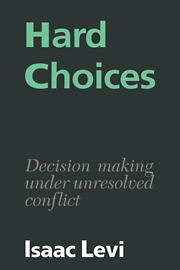Book contents
- Frontmatter
- Contents
- Preface
- 1 MORAL STRUGGLE
- 2 DILEMMAS
- 3 VALUES IN SCIENTIFIC INQUIRY
- 4 CHOICE AND FOREKNOWLEDGE
- 5 VALUE STRUCTURES
- 6 VALUES REVEALED BY CHOICES
- 7 UNCERTAINTY AS A SOURCE OF CONFLICT
- 8 CONFLICT AND SOCIAL AGENCY
- 9 DISTRIBUTING BENEFITS
- 10 UTILITARIANISM AND CONFLICT
- 11 SOCIAL CHOICE THEORY
- 12 CONFLICT AND INQUIRY
- Notes
- Bibiliography
- Name index
- Subject index
7 - UNCERTAINTY AS A SOURCE OF CONFLICT
Published online by Cambridge University Press: 05 June 2012
- Frontmatter
- Contents
- Preface
- 1 MORAL STRUGGLE
- 2 DILEMMAS
- 3 VALUES IN SCIENTIFIC INQUIRY
- 4 CHOICE AND FOREKNOWLEDGE
- 5 VALUE STRUCTURES
- 6 VALUES REVEALED BY CHOICES
- 7 UNCERTAINTY AS A SOURCE OF CONFLICT
- 8 CONFLICT AND SOCIAL AGENCY
- 9 DISTRIBUTING BENEFITS
- 10 UTILITARIANISM AND CONFLICT
- 11 SOCIAL CHOICE THEORY
- 12 CONFLICT AND INQUIRY
- Notes
- Bibiliography
- Name index
- Subject index
Summary
Uncertainty
Moral struggles of the second kind are generated by decision problems in which the feasible options are evaluated according to different value commitments in incompatible ways. I have argued that such predicaments call for suspending judgement concerning the applicability of the competing value commitments and evaluating the feasible options with the aid of a value structure which mirrors this unresolved conflict.
Conflict in value structures can arise without being directly generated by conflicts among value commitments. For example, a physician may be convinced (rightly or wrongly) that abortion is wrong except when it will prevent the death of the mother or serious physical harm to her. This value commitment may be used to evaluate feasible options open to the physician, provided that the physician can make a sure determination of the prospects of the mother being seriously harmed by seeing the baby through to term. There is no conflict between the physician's value commitment and other commitments he endorses.
Difficulties arise, however, if the physician does not know whether the mother will die if the baby is carried through to term. In that event, the physician will not know whether performing an abortion or refraining from doing so is the option mandated by his value commitment. There is no conflict between his value commitments. Still the physician does not know how to apply his value commitment to the feasible options under the descriptions according to which they are optional for him.
- Type
- Chapter
- Information
- Hard ChoicesDecision Making under Unresolved Conflict, pp. 108 - 148Publisher: Cambridge University PressPrint publication year: 1986



